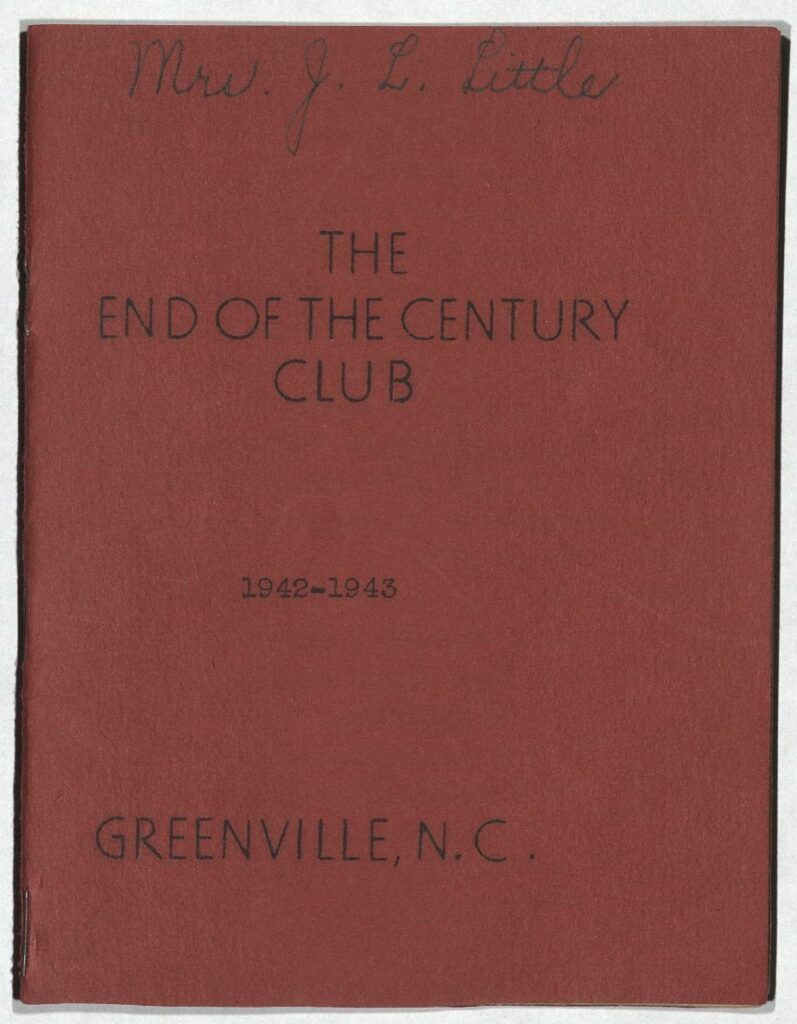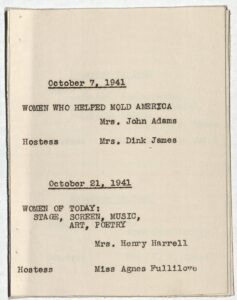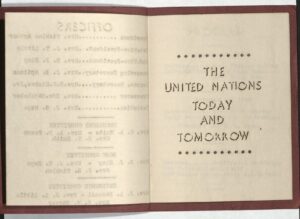Gathering Around Books: The History and Influence of Women’s Book Clubs

Front Cover of the End of The Century Club 1942-1943 program. End of the Century Book Club Papers (#150), East Carolina Manuscript Collection, J. Y. Joyner Library, East Carolina University, Greenville, North Carolina, USA.
Historically, Women’s book clubs have been more than just gatherings to discuss literature. They have served as spaces for intellectual growth, community building, and even social activism. Joyner Library’s Special Collections has a variety of materials related to women’s book clubs, including those in the Chatham Book Club Collection, the Clio Book Club Collection, and the End of the Century Book Club Collection. These collections provide insight into how these groups reflected and responded to the world around them, particularly during times of global upheaval like World War II.
The Chatham Book Club, founded in 1937, provides a fascinating glimpse into how women engage with global events. During the early 1940s, their meetings often focused on foreign countries and America’s increasing involvement and eventual joining of World War II. In October 1941, they held meetings on National Navy and Army defenses, and by 1945, topics included “War Prisoners” and “The Disabled Soldier.” These discussion topics reflect the book club members’ interest in discussing current events and the changing world around them.
Similarly, the Clio Book Club, founded in 1937, demonstrated a keen interest in global politics and significant historical figures. In the late 1930s and early 1940s, their meetings frequently touched on countries in WWII, such as England, Germany, and Russia. By 1941, they shifted focus to the role of women in society, with meetings dedicated to “Women who Helped Mold America” and “Women of Today.” Clio Book Club Records (Manuscript Collection #579). These topics highlight how the Clio Book Club explored women’s contributions to history and society.
The End of the Century Book Club, founded in 1899, offers another layer of insight. Their 1942-1943 meetings focused on “The Political Background of the Warring Nations,” reflecting the global conflict of the time. By 1945-1946, their discussions had shifted to the newly formed United Nations, showing how the club adapted to post-war realities. Beyond their intellectual pursuits, the End of the Century Book Club also played a civic role, contributing to the founding of the Sheppard Memorial Library.
These book clubs were not just about reading but community and philanthropy. The Clio Book Club, for instance, was deeply involved in community service, such as fundraising for foster children and foster homes in Greenville. The End of the Century Book Club also served as a civic organization, blending literary discussion with social responsibility.
Book clubs played an important role in women’s lives by providing them with a space to engage in intellectual discussions at a time when they were often excluded from formal education. According to Mary Kelley, a professor at the University of Michigan, nearly every town in the U.S. had a women’s literary group by the time of the Civil War. However, the book clubs that have been highlighted here served a bit of a different purpose from earlier book clubs, like the clubs founded during the Civil War. After the Civil War, women’s book clubs were typically founded and organized by middle and upper-class women who were still confined to a relatively narrow sphere of domesticity while having more leisure time (Craig, 2019).
In conclusion, women’s book clubs were far more than just social gatherings. They were spaces for education, activism, and community building. By examining these collections, we gain a deeper understanding of how women navigated and influenced the world around them.
Sources
- Craig, Christy. “Reading Identity: American and Irish Women’s Book Clubs, Culture, and Identity.” Irish Journal of Sociology 27, Issue 2 (2019): 128-52. https://doi.org/10.1177/0791603519828664
- Kelley, Mary. “‘A More Glorious Revolution’: Women’s Antebellum Reading Circles and the Pursuit of Public Influence.” The New England Quarterly 76, no. 2 (2003): 163-96. https://doi.org/10.2307/1559902

